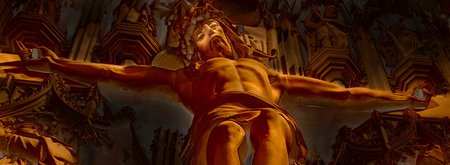Did Jesus really claim to be God?
A previous article addressed the question, ‘Does the Bible really attest to the deity of Jesus?’ by looking at several instances where New Testament characters pointed to the deity of Christ. This article shows how the Scriptures provide witness to Christ’s deity; only here we will see that Christ himself claimed to be God.
On a number of occasions, Jesus implied that he was equal with God the Father by receiving honor and worship that only God should receive. In a confrontation with Satan, Jesus said, ‘It is written, "You shall worship the Lord your God, and serve him only”’ (Matthew 4:10). Yet Jesus received worship as God (Matthew 14:33; 28:9) and sometimes even demanded to be worshipped as God (John 5:23; compare Hebrews 1:6; Revelation 5:8–14).
We see an example of this when Peter confessed Christ’s deity after Jesus asked him who he was: ‘Thou art the Christ, the Son of the living God’ (Matthew 16:16). Jesus responded to Peter’s confession not by correcting his conclusion but by acknowledging its validity and source: ‘Blessed are you, Simon Barjona, because flesh and blood did not reveal this to you, but My Father who is in heaven’ (Matthew 16:17).
Then we have Christ’s conversation with Thomas, who said, ‘I won’t believe unless I can put my finger into his nail scars.’ He said, ‘Look, not every day does someone raise himself from the dead or claim to be God incarnate. I need evidence.’ Eight days later, after Thomas chronicled his doubts about Jesus before the other disciples, ‘Jesus came, the doors having been shut, and stood in their midst, and said, “Peace be with you.” Then he said to Thomas, “Reach here your finger, and see my hands; and reach here your hand, and put it into my side; and be not unbelieving, but believing.” Thomas answered and said to him, “My Lord and my God!” Jesus said to him, “Because you have seen me, have you believed? Blessed are they who did not see, and yet believed”’ (John 20:26–29). Jesus accepted Thomas’s acknowledgment of him as God. He rebuked Thomas for his unbelief, but not for his worship.
We also find instances in which Jesus not only claims his equality with God, but he also clearly asserts that he is one with the Father. During the Feast of the Dedication in Jerusalem, Jesus was approached by some Jewish leaders who asked about his being the Christ. Jesus ended his comments to them by saying, ‘I and the Father are one’ (John 10:30). The Jews’ response only affirms that Jesus was in fact claiming to be God: ‘For a good work we do not stone you, but for blasphemy; and because you, being a man, make yourself out to be God’ (John 10:31–33).
Jesus continually spoke of himself as one in essence and nature with God. He boldly asserted, ‘If you knew me, you would know my Father also’ (John 8:19); ‘He who beholds me beholds the One who sent me’ (John 12:45); ‘He who hates me, hates my Father also’ (John 15:23); ‘All may honor the Son, even as they honor the Father. He who does not honor the Son does not honor the Father who sent him’ (John 5:23). These references certainly indicate that Jesus looked at himself as being more than just a man; rather he was equal with God.
If anyone were to still doubt whether Christ claimed to be deity, he should take a look at the record of Jesus’ trial proceedings recorded in the Gospel of Mark (14:60–64). Here we find one of the clearest references of Christ’s claim of deity: ‘And the high priest arose and came forward and questioned Jesus, saying, “Do you make no answer to what these men are testifying against you?” But he kept silent and made no answer. Again the high priest was questioning him, and saying to him, “Are You the Christ, the Son of the Blessed One?” And Jesus said, “I am; and you shall see the Son of Man sitting at the right hand of Power, and coming with the clouds of heaven.” And tearing his clothes, the high priest said, “What further need do we have of witnesses? You have heard the blasphemy; how does it seem to you?” And they all condemned him to be deserving of death.’
At first Jesus wouldn’t answer, so the high priest put him under oath. Being under oath, Jesus had to answer. He responded to the question, ‘Are You the Christ, the son of the Blessed One?’ by saying ‘I am.’
Excerpts taken from More Than a Carpenter, Josh McDowell. Living Books, 1977.
Scripture quotations are taken from the New American Standard Bible.
© 2001-2002 Josh McDowell Ministry
Josh McDowell Ministry, 2001 West Plano Parkway, Suite 2400, Plano, TX 75075, USA
Tel: +1 972 907 1000 www.josh.org



